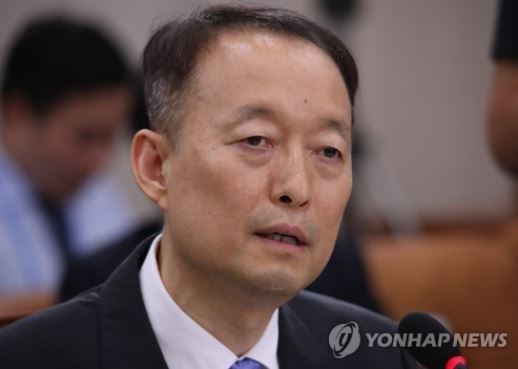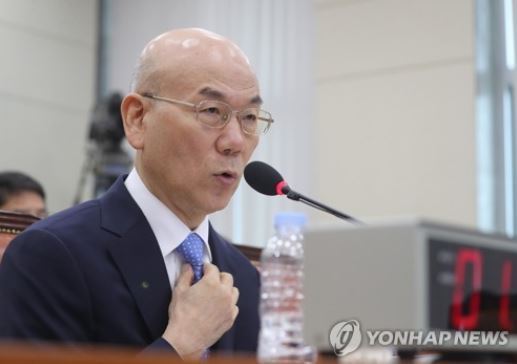Industry minster nominee vows to pursue energy policy shift based on social consensus
By Catherine ChungPublished : July 19, 2017 - 14:18
Trade, Industry and Energy Minister nominee Paik Un-gyu said Wednesday that if appointed, he will pursue the new government's nuclear power phase-out policy based on "social consensus."
He made the remarks during a parliamentary confirmation hearing amid fears that President Moon Jae-in's energy policy shift could result in a hefty rise in electricity prices and energy shortage in a country heavily dependent on energy imports.
Last month, Moon vowed to scrap all plans for new nuclear power plants and not to extend the operation of any aged reactors nearing the end of their life cycles, while reaffirming his pledge to close at least 10 aged coal-fired power plants. The move underscored Moon's pursuit of clean, safe and renewable energy sources.
He made the remarks during a parliamentary confirmation hearing amid fears that President Moon Jae-in's energy policy shift could result in a hefty rise in electricity prices and energy shortage in a country heavily dependent on energy imports.
Last month, Moon vowed to scrap all plans for new nuclear power plants and not to extend the operation of any aged reactors nearing the end of their life cycles, while reaffirming his pledge to close at least 10 aged coal-fired power plants. The move underscored Moon's pursuit of clean, safe and renewable energy sources.

"(I will) pursue the process of the policy transition based on social consensus through sufficient discussions, including soliciting expert opinions on the issue," he said, stressing the whole process will be carried out in a "transparent and fair" way.
"I will seek to advance the time -- when (citizens can) breathe cleaner air and live in a safer environment -- by gradually reducing nuclear and coal-fired power plants that have spawned concerns about safety and environmental (pollution), and through increasing renewable energy supplies," he added.
Asked about the allegations that the government has suspended the construction of two nuclear reactors in Ulsan, 414 kilometers southeast of Seoul, without considering its potential ramifications, the nominee said that the government's policy road map has been crafted after its "comprehensive" review of the potential impacts, including one on energy prices.
Touching on Washington's recent request for a revision to the South Korea-US free trade agreement, Paik said that he will "confidently" deal with it under the principles of maximizing national interests and striking the right balance of interests between the countries.
He also pledged to "enhance" strategic economic cooperation with China and Japan to increase benefits from the trade relations with the neighbors.
"I will thoroughly cope with the pending trade issues through interagency cooperation and seek to bolster our trade negotiation capabilities," he said.
Paik also stressed his resolve to help foster new industries, such as smart cars and intelligent robots, by capitalizing on the country's leading-edge technologies and manufacturing capacity.
During the hearing, Paik was grilled over the suspicion that he dodged mandatory military service in the 1980s. In his first physical checkup in 1985, he was listed as fit for active duty, but four years later, he was exempted from duty following a car accident.
"I apologize to the citizens for failing to fulfill the sacred duty," he said, while rejecting the notion that he intentionally dodged military service.
Paik also came under fire for the allegation that he had served as an outside director for a local firm without permission from a Seoul university where he has taught since 1999 -- in breach of the private school law.
For this, he also apologized, saying he has failed to "properly take care of" the issue.

Also on Wednesday, the parliament held a confirmation hearing for Korea Communications Commission chief-nominee Lee Hyo-seong.
Lee said that if appointed, he would work to ensure that public broadcasters produce fairer, unbiased content, and that their programs would not be skewed in favor of "particular political forces."
"Over the past years, there has been much criticism over the fairness of public broadcasters," Lee, a professor at Sungkyunkwan University, said. "I will take due measures if necessary after looking into the situation to see if there really are problems."
During the hearing, opposition lawmakers attacked him over a series of allegations against him, ranging from real estate speculation to false address registration.
Earlier in the day, Lee Hye-hoon, the leader of the minor opposition Bareun Party, demanded the president cancel his nomination, calling Lee unfit for the KCC post. (Yonhap)











![[Hello India] Hyundai Motor vows to boost 'clean mobility' in India](http://res.heraldm.com/phpwas/restmb_idxmake.php?idx=644&simg=/content/image/2024/04/25/20240425050672_0.jpg&u=)







